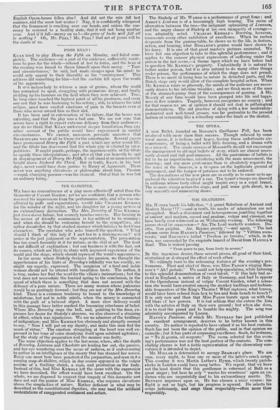THE GAMESTER.
WE have no remembrance of a • play more effectivelg acted than the Gamester at Covent Garden ; yet we are confident, that a person who received his impressions from the performance only, and who was Un- affected by puffs and expectations, wculd take CHARLES KEMBLE for the wonder of the night, and his daughter for a young actress of no extraordinary distinction. The Mrs. Beverley of Miss liEmBL.E just rises above failure,. but scarcely touches success. Her bearing in the scenes of friendly communion is too artificial to be winning ; and when she should be endearing herself to the sympathies, she rather dissatisfies by that studied manner which belone-s to factitious characters. The spectator who asks himself the question, " What should I think of this lady if I met her in a drawing-roam r will arrive at the just judgment on the representation. The personation has too much formality in it for nature, or the skill of art. The fault is not difficult of explanation ; but our business is with the fact, not its causes, which are likely to abate with improved experience of the world and the stage, which should represent the world's appearances. In the scene where Stokely declares his passion, we thought the apprehension of his hints of Beverley's infidelity was too readily, we might say eagerly, expressed. The suspicion of a fond and noble woman should not be uttered with breathless haste. The author, it is true, makes her find the word for the villain's insinuations ; but the text does not necessitate the hurried spring to the conclusion, in the speed of which there is something that does not accord with the delicacy of a pure nature. There are many women whose jealousies would be so pantingly forward ; but they are not of the Mrs. Beverley kind. There is a common tendency to bound to the knowledge of misfortune, but not in noble minds, when the misery-is connected with the guilt of a beloved object. A more slow delivery would in this passage have better marked the becoming reluctance of belief. Where Mrs. .Beverley rings the bell, and, pointing to the door, ex- presses her desire for Stokely' s absence, we also observed a straining at effect, which was injudicious. We are no admirers of the bridlings of indignation; and Miss KEMBLE too obviously and abruptly seemed to say, "Now I will put on my dignity, and make this man feel the scorn of virtue." The emotion struggling at the heart was well ex- pressed in her tone of' voice steadying itself upon subdued agitation ; but the study of the preparation mid the manner was faulty. The same objection applies to the last scene, where, after the death. of Beverley, Leweson and Charlotte are leading her out, she passive, and her eye wandering over the scene of sadness, as if endeavouring to gather in an intelligence of the misery that has stunned her senses. Every one must here have penetrated the preparation, and seen in it a coming coup-de-thlatre, which in due course appeared in the vulgar routine -of a thrilling shriek, a rush, and prostration on the body. Instead of this, had Miss KEMBLE left the scene with the expression we have described, the effect would have been excellent. On the whole, we are disposed to suspect that tragedy of this domestic sort does not suit the genius of Miss KEMBLE, who requires elevations above the simplicities of nature. Rather deficient in what may be described as the constitutional dignities, she may need the artificial sustentations of exaggerated sentiment and action. The Stokely of Mr. WARDE is a performance of great force; and ABBOT'S Leweson is of a becomingly high bearing. The scene of altercation between the two—the indignant upbraiding of Leweson, and the angry shame of Stokely at his own incapacity of courage— was admirably acted. CHARLES KEMBLE'S Beverley, however, transcends every other exhibition of excellence. When he rushes desperate from the gaming-table, he shows us to the life, in feature, action, and hearing, what HOGARTR'S genius would have shown to his fancy. It is one of that great master's pictures animated. We have but one objection to take to this splendid performance • and it applies to the coarser physical expressions of suffering under the poison in the last scene,—a theme upon which we have before had to question Mr. KEMBLE'S propriety. Undoubtedly it is natural to bellow under poison, but it is also natural to do many other things under poison, the performance of which the stage does not permit. There is no merit in being true to nature in detached parts, and the Dutch stage only would allow of the complete hospital action. When Mr. KEMBLE roars so piteously, the minds of the audience are neces- sarily drawn to his intestine troubles ; and we think more of the uses of the stomach-pump than of the consequences of gaming. A Mr. Beverly of our time would have been pumped into life and happi- ness in five minutes. Tragedy, however, recognizes no surgery ; and for that reason we are of opinion it should not deal in pathological demonstrations. The old practice of dying with a few moderately- protracted and well-toned groans, was far preferable to the present fashion of screaming like a schoolboy under the birch or the dentist.


















 Previous page
Previous page